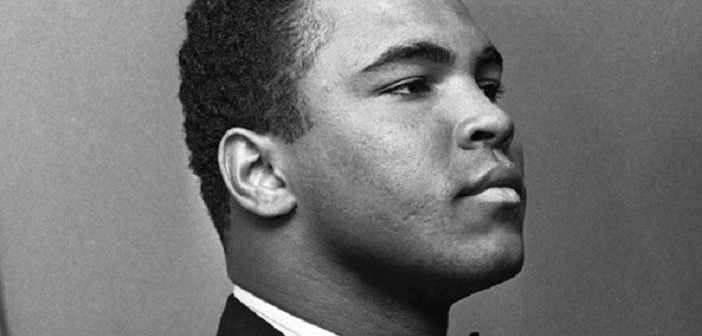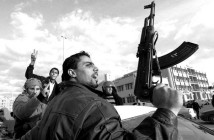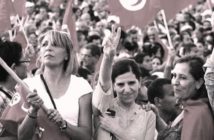The People’s Champ’ has died early this morning… Tribute to one of my favourite heroes: Muhammad Ali Clay (1942-2016).
I do not belong to the generation of Muhammad Ali but rather that of “Iron Mike” (Tyson) who was my boyhood’s fighting hero. I was not even born at the time of his greatest fights.
In high school, I was often top student, but I remember that I had big troubles with many classmates from underprivileged neighborhoods who were out to get me permanently.
At one time, I really had to choose between protecting myself or to stop studying there. In fact, in the late 1990s and early 2000s, Regionalism was still at its apogee in my country. Ironically, my surname didn’t help me to escape this scourge. Indeed, “Gabsi” is an adjective that refers to Gabès; it is a southern city of Tunisia. I loathed discrimination but I did not want to leave my northern city and my good friends.
So, as a teenager, I started playing football and used to do boxing from 13 to 17 year-old. I also began watching Cassius Clay boxing since the age of 13, when my dad -a former senior Security and SIS officer- convinced me to join the youth boxing team of the national security forces. He has always held that I should practice a sport in a club close to his home.
I even remember that the security authorities had turned an old church of the city into a very discreet HQ which contained a boxing gym near the residence of their top security and military officers. I was thin, but they found my punches “very brutal”.
Then came “The Bleeding Tears of My Young Enemies” Chapter. It was not that funny. School’s bad boys used to push us into a sort of ditch near the athletic fields. Then, all the little ‘spectators’ attending the fighting had to bet on the “Kid of the slum” or the “Teachers favorite student”. I hated using my hands in high school and in the neighborhood. I was like a tiny dandy who wanted to maintain his good image. I was, above all, afraid that my parents see my clothes been torn off. Although there was always a part of humiliation and provocation to which I never responded, I do not remember losing any “face-to-face”. I was most certainly too lucky and not necessarily the best brawling.
Humans with great ambitions fascinate us easily. We respect them so much. Ali was great as well as his ambitions.
To me, Ali was a symbol of conviction and faith, a true example of “Personal Success” inside a hard cultural and segregation context. He was also a role model of what “Political Resistance” and “Provocation” are.
Moreover, in the crucial stages of my early life, I often kept some of his famous quotes in my head, such as:
‘‘Floats like a butterfly, sting like a bee, his hands can’t hit what his eyes can’t see. ’’ Or, ‘‘ I hated every minute of training, but I said, ‘Don’t quit. Suffer now and live the rest of your life as a champion’. ’’ And, of course, that famous ‘‘Imma show you how great I am.’’
People may not like the overweening side of Muhammad Ali. I remain convinced that he was a good person who just starred as the “Legendary Ego”, only in front of the camera. I think, also, he created a sort of “public character” just to reject the fake ethics of a very hypocritical and racist American society (of that time).
Perhaps Ali was a “badass” and too loquacious in his youth, but he never kept his tongue in his pocket.
Clay has nothing to envy to the greatest rappers and contemporary philosophers too, as he once said that “impossible is just a big word thrown around by small men who find it easier to live in the world they’ve been given, than to explore the power they have to change it. Impossible is not a fact. It’s an opinion. Impossible is not a declaration. It’s a dare. Impossible is potential. Impossible is temporary. Impossible is nothing.”
Finally, concerning the U.S. wars and military interventions, Muhammad Ali declared “I ain’t draft dodging. I ain’t burning no flag. I ain’t running to Canada. I’m staying right here. You want to send me to jail? Fine, you go right ahead. I’ve been in jail for 400 years. I could be there for 4 or 5 more, but I ain’t going no 10,000 miles to help murder and kill other poor people. If I want to die, I’ll die right here, right now, fightin’ you, if I want to die. You my enemy, not no Chinese, no Vietcong, no Japanese. You my opposer when I want freedom. You my opposer when I want justice. You my opposer when I want equality. Want me to go somewhere and fight for you? You won’t even stand up for me right here in America, for my rights and my religious beliefs. You won’t even stand up for my rights here at home.”
As seen in several of Ali’s old videos, I find his “You are the only one who does not understand who is Muhammad Ali” behavior, very humorous.
Obviously, what Clay did in the ring was secondary to what he meant outside of the ring. And the major reason for which I really like this legendary athlete is because he never changed his attitudes and convictions to be what Media and Society like to have.
That being said, one might wonder why an unknown person like me has to pay tribute to a famous US citizen, precisely Muhammad Ali.
Well, Ali is an overwhelming ‘excuse’ to write a few words about the Tunisians. Ali was a revered legend in North Africa. In that sub-region, especially in Tunisia, he was so famous for his political involvement.
Then, Ali was somehow the incarnation of the resistant oppressed. He was the epitome of what a rebellious spirit should be.
Everyone knows that Muhammad Ali performed feats far beyond the sporting context.
Because of his anti-war position and opinions, he was demoted from “Supreme King” to ‘Former world champion’, as he was stripped of his title and his civil rights. Then, in 1967, Ali has been sentenced to five years in prison, fined $10,000 and banned from boxing for three years, because he refused to fight in Vietnam. In fact he publicly considered himself a “conscientious objector” and stated: “War is against the teachings of the Quran. I’m not trying to dodge the draft. We are not supposed to take part in no wars unless declared by Allah or The Messenger. We don’t take part in Christian wars or wars of any unbelievers.”
His life revolved around his fight for the freedom of the American black community, the victim of a segregationist system.
On the African mainland, Ali fought in Zaire (actual D.R. Congo) against Foreman but he continues to remind the political reason of his presence.
Nowadays, the former plight of black Americans becomes the contemporary nightmare of the Tunisian society. Elitism, snobbism and soft racism are all quite rampant in my country.
Personally, I studied at the most prestigious national Law School in which several of my former acquaintances refused to shake the hands of the black students (students from Sub-Saharan Africa in particular), in the late 2000s. This has never aroused the slightest anger or questioning. This is normal, we live with morons.
In Tunisia, many good citizens don’t regret to live in a “small” State which is still too corrupt, despite a great Revolution. They are sick and tired of almost everything but they accept it as a fact. They really believe that their motherland is not a hotel they leave just because the service is too bad. They only want to kick the asses of all the local antiheroes of the 2011 Revolution and all the vultures of the modern State (including sport).
At the moment, this African country is totally done, because of thousands and thousands of villainous people full of false values, false beliefs, and false intensions.
Tunisians suffer from a kind of poverty of the spirit. Tunisia itself suffers from a sort of unpatriotic and “Anarcho-Syndicalism” which is akin to Terrorism Union, even as the country is economically dead. All this forms a kind of Ku Klux Klan against the helpless Citizen and the Nation.
After the Revolution, all the excessive wage demands and strikes should have been temporarily banned. The National Army should have forced all the people to work exclusively for the country’s recovery and imprisoned anyone who impeded this main objective, until the Tunisian economy stabilizes.
Fortunately, there are plenty of rebellious and combative spirits, from Ben Guerdane to Bizerte, ready to serve this country and to die for it. This is especially the case of all those young people who kicked “The Dictator” out, even if they continue to live in a destructive country that kills ambition.
Now, let’s go back to “The Champ”. The Tunisian youth live and breathe sport. They’ve always been fascinated by Ali. Beyond the sporting symbol of “The Greatest (Boxer)” and his glorious fights, he conquered them both by his bold speech and his courageous stands with respect to his country and to the U.S. society.
My modest Tribute to Muhammad Ali is ultimately “The Excuse” to remind that -instead of killing each other over trivial matters- the most influential Tunisian intellectuals of the Post-Revolutionary Era must be very determined to sensitize the Tunisian youth who still have the spirit of peace, of social justice, of freedom, and success, to give them a hand for the grand project of “The Tunisian Modern State” can see the light of day.
“The Greatest” is gone at 74. We should thank him for illuminating all these rebellious spirits.
However, I hope that Tunisia is not dead yet.





